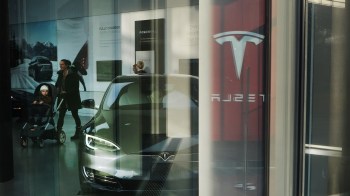Tesla asks: What’s the point of car dealers?
Tesla wants to sell its upscale electric cars directly to you, not through a local dealership, like Ford and GM do. The company doesn’t believe conventional dealers will do a good job selling its new and unusual car. And of course, it doesn’t want to share profits with them either.
But it’s proving to be a rocky road. Car dealers are politically powerful and protected by strong franchising laws. The Internet has cut out middlemen of all kinds, yet car dealers haven’t gone anywhere. A combination of history and politics explains why the way we buy cars is so differently than just about anything else.
The politics behind the endurance of car dealerships is pretty simple: State officials are elected to protect jobs and revenue, and car dealerships provide both — as dealers remind politicians at every opportunity.
“In our state, we have over 87,000 employees,” says Bill Wolters, president of the Texas Automobile Dealers Association. He adds that dealerships provide Texas with billions in sales taxes and economic impact.
But politics isn’t the whole story. Dealerships date back to the very first cars, those unreliable, smoke-belching contraptions. Remember, dealers sell cars and fix them too. At a time when cars broke down frequently, automakers wanted some consistency in how they were repaired. Dealership franchises provided that.
“Having a network of individuals who provided service locally was worth a lot, and so that became the dominant system through which cars were sold,” explains University of Michigan professor Francine Lafontaine, an expert on franchising.
Over the years, dealers felt they needed more leverage. It started when carmakers made dealerships upgrade repair technology to keep up with increasingly complex vehicles. Dealers did so, but wanted assurances that if they invested in expensive new improvements, they’d be able to hang on to their franchises and earn back the money they sunk into them.
“We have to have some guarantee on our side that we’re not subject to the whims of the manufacturer if they would decide to cancel our franchise contract,” as Edmunds.com senior editor Bill Visnic explains the dealers’ thinking.
In the ’70s, states passed stronger laws protecting dealerships so carmakers couldn’t go around them. Online ventures and automakers large and small have all tried and failed to do so since. Tesla has a tough fight ahead.
There’s a lot happening in the world. Through it all, Marketplace is here for you.
You rely on Marketplace to break down the world’s events and tell you how it affects you in a fact-based, approachable way. We rely on your financial support to keep making that possible.
Your donation today powers the independent journalism that you rely on. For just $5/month, you can help sustain Marketplace so we can keep reporting on the things that matter to you.


















